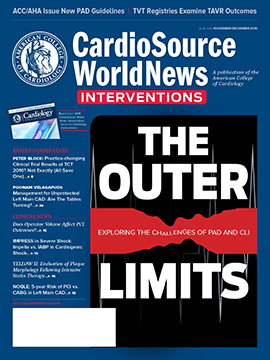Peripheral Matters | ACC, AHA Issue Updated Recommendations for PAD Patients
Peripheral Matters | ACC, AHA Issue Updated Recommendations for PAD Patients
CardioSource WorldNews Interventions | An updated guideline from the ACC and American Heart Association provides comprehensive recommendations for the treatment of lower extremity peripheral artery disease (PAD). The new guideline, which updates the previous guideline from 2011, includes recommendations on the use of antiplatelet therapy to reduce the risk of blood clots, as well as the use of statin drugs to lower cholesterol.
The guideline continues to recommend use of statins and antiplatelet therapy, such as aspirin or clopidogrel, to manage PAD. It also discusses situations when dual-antiplatelet therapy may be considered, such as after vascular surgery or stenting procedures.
Additionally, the guideline emphasizes that signs and symptoms of PAD include not only claudication, but other atypical leg symptoms or walking impairments, ischemic rest pain, or physical examination findings such as abnormal lower extremity pulses, vascular bruit, non-healing wounds or gangrene. Health care provides should continue measuring ankle brachial index (ABI) for patients with these PAD signs and symptoms.
The guideline also recommends patient participation in a structured exercise program that is individualized to the patient and includes specific instructions for the type, frequency, intensity and duration of exercise. The most effective form of structured exercise, according to the writing committee, is a supervised exercise program in a hospital or outpatient exercise facility, but other options include home- or community-based walking exercise or alternative forms of exercise such as upper-body exercises.
While previous guidelines emphasized the importance of smoking cessation for PAD patients, the new guidelines also strongly advise patients to avoid second-hand smoke. The also recommend PAD patients receive an annual flu shot to avoid cardiovascular complications related to the flu.
“Periodically reassessing how we manage and treat complex diseases by incorporating the latest evidence is critical to ensure that clinicians are equipped to provide optimal care for their patients,” said Marie Gerhard-Herman, MD, FACC, chair of the writing group and a cardiologist at Brigham and Women’s Hospital.

|
Read the full November/December issue of CardioSource WorldNews Interventions at ACC.org/CSWNI |
Clinical Topics: Cardiovascular Care Team, Diabetes and Cardiometabolic Disease, Dyslipidemia, Prevention, Vascular Medicine, Atherosclerotic Disease (CAD/PAD), Lipid Metabolism, Nonstatins, Exercise
Keywords: CardioSource WorldNews Interventions, American Heart Association, Ankle Brachial Index, Aspirin, Cholesterol, Exercise, Exercise Therapy, Intermittent Claudication, Outpatients, Patient Participation, Peripheral Arterial Disease, Ticlopidine
< Back to Listings
